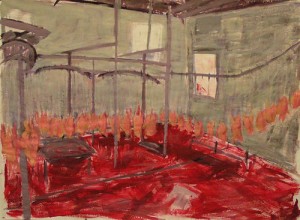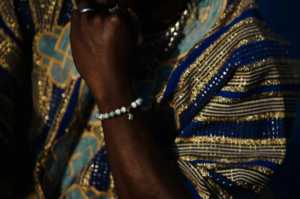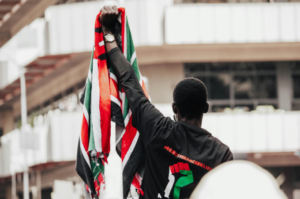He was only a Lance Corporal when he died. We knew of his death because his wife screamed. The nights had been  mostly quiet, with the constant blackouts and whatnot. Of course, there was always the feeble chirping of crickets freezing in the cold harmattan nights. Sometimes you’d hear faint jingle of bells coming from the abandoned cassava mill where the white garment church kept nightly vigil. But for the most part, the nights were quiet. That’s why when the Corporal’s wife bellowed, her voice carried far beyond the walls of our small commune of soldiers.
mostly quiet, with the constant blackouts and whatnot. Of course, there was always the feeble chirping of crickets freezing in the cold harmattan nights. Sometimes you’d hear faint jingle of bells coming from the abandoned cassava mill where the white garment church kept nightly vigil. But for the most part, the nights were quiet. That’s why when the Corporal’s wife bellowed, her voice carried far beyond the walls of our small commune of soldiers.
As the Chaplain of St Agnes, my Father was summoned. The man’s wife said he ate his evening meal and then died. Just like that. My father suggested a coroner’s inquest. His superior, one Warrant Officer Ajai, agreed. By noon that day, the body had been taken to the military hospital. My father later said that the widow held her head in both hands and cried. She was clearly heartbroken, but the real source of her suffering was not losing a husband but having to face a tribunal of in-laws who, coroner’s inquest or not, would not understand how an able bodied man dies from simply eating food. The deadman was taken home to his village somewhere in the old Bendel State.
Rumor has it that the family of the corpse could not rest until the body was subjected to a set of esoteric rituals performed by a rare and dying breed of medicine men. The idea was to reunite the ghost of the dead man with his carcass. The rituals were expensive, elaborate, and occult but it was no different from an order summoning a witness to appear before a court. A subpoena for the dead. The medicine man appealed to the principalities of Heaven and other higher powers to refuse the dead man passage to the other world. The deadman may then choose to wander aimlessly in childish disobedience to the directive. But he would eventually grow weary and realize that he would not be allowed to arrive at his final destination unless he made a detour, a return to his native body, to answer questions about his death.
When the body was ready for questioning, it was brought before a closed group of jurors drawn from both sides of the family. I can imagine the deadman’s face contorted from the pain he suffered. His hands crooked and eyes open from rigor mortis. He’s probably lying on a straw mat astonished that his relatives would not just let him be. Anyway, as the report says, the medicine man approached the dead body, holding a bundle of twigs cut from a guava tree. Standing at a safe distance, he beat the body with the guava twigs until it stood up, to the amazement of the jury of relatives. Quickly, the medicine man asked: “Dead man, who is your killer?” The problem with the question, from a legal standpoint, is that it assumes far too much. One of the obvious being the assumption that the man was killed by someone. What if he were killed by something and not someone, let’s say, the bottles of local gin he guzzles on a daily basis? Anyway, the corpse sat upright, mechanically, like a marionette. It’s funny ’cause I can recall this part of the story scarring me to smithereens.
The gossip that told us the story was a new wife who lived on Block 18, about 15 doors down from our set of rooms. She had stopped by my place late at night to return a utensil she’d borrowed from my mother, one of those wide pans used to “fry” garri. The yellowy light from the kerosene lamp, the zombie-look of captivation on everyone’s face, the gossip’s theatrics. I felt uneasy and peered into the dark, wondering whether the deadman eventually made it home safely to the other world. The rest of the story was not disappointing, strangely enough, because it was expected. The wife was found guilty and this made her widowhood rites a bit more complicated. It was many years later, when on reading a similar event in Apuleius‘s Golden Ass, that I realized that no one asked the gossip whether the corpse actually spoke and what it said. What really was the nature of the testimony?
Photo: Sharon Hodgson










COMMENTS -
Reader Interactions